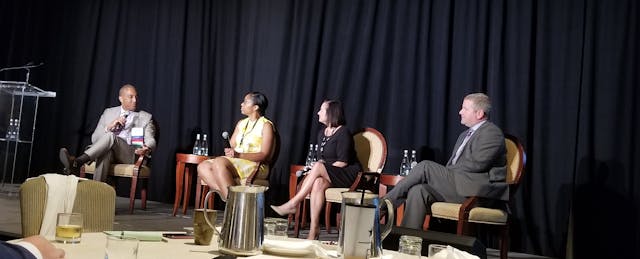Are startup CEOs overrated? At the Software & Information Industry Association’s Ed Tech Industry Conference in San Francisco this week, that was among the questions raised during a panel on venture capital trends in education.
During a moment when the panel moderator asked attendees what investors over value in startups, some audience members said investors can focus solely on the personality of the boss, instead of evaluating what other C-suite executives can bring to the table.
A couple of panelists came to CEOs’ defense. CEOs have the difficult task of cheerleading the company but providing realistic performance projections to investors, said Geo Kane, general manager of education ventures at Emerson Collective. “They have to find that sweet spot,” Kane said.
Deborah Quazzo, managing partner of early-stage venture fund GSV AcceleraTE, admitted that “every mistake I made was CEO related” when it came to companies she’d invested in, but only a great CEO can build the right supporting cast to keep the company humming. “I don’t think you can ever underestimate the importance of a CEO,” Quazzo said.
About 120 people registered for the conference, many of whom seeking tips and advice on how to get in front of the holders of education’s pursestrings—whether they be school officials, foundations or private investors.
Audience members in the investor panel said investors can also under value qualities like a background in education instead of a background in business, a company’s exit strategies, a company’s government grant funding and changes in education policy.
Quazzo said that investors new to the education industry can underestimate how politics can shape the market. Missing political headwinds, like what happens if some of the policies proposed by Democratic presidential candidates were to be enacted, can have major financial consequences for education companies.
For example, according to Quazzo, Democratic presidential candidate and U.S. Senator from Massachusetts Elizabeth Warren co-wrote a letter to the Department of Education criticizing income share agreements, a popular revenue model for non-traditional education providers like bootcamps and an increasingly popular tuition payment method among higher-ed institutions. Regulations around such agreements could hurt edtech startups, and edtech investors should be prepared. “The environment in higher education is fraught with policy risk,” Quazzo said.
Ever More Room to Build Trust in the Market
A panel of foundation leaders told the SIIA audience that nonprofits and educators still question whether edtech companies exist to help students or to just make money. “There’s a natural distrust of any special interests that may be engaging in education in ways that have bad intentions or don’t align with actually serving students,” Bill and Melinda Gates Foundation Deputy Director Henry Hipps told the audience during a panel for foundation executives. “It’s not necessarily a true thing, but you see why the fear is there.”
Superintendent Susan Enfield of Highline Public Schools in Washington state echoed the point during a later panel featuring school district leaders.
She said startup representatives who haven’t researched a school district and can’t say if their product or service will help with performance gaps among races, genders and other demographics leave her with the impression the company isn’t trustworthy. “I don’t want to work with shady people,” Enfield said.
Another red flag for district officials when vetting companies: a lack of diversity in their teams and product pitches. David Schuler, superintendent of Township High School District 214 in Illinois, had strong words for companies with presentations that only feature pictures of white children. “You will lose our business,” he said. “You have no shot of getting in.”
Enfield said she’s even urged local technology companies in her part of Washington state to create internship programs for underrepresented students and create a more welcoming workplace. “My kids are your future employees if we get it right,” she said.


